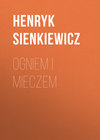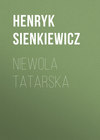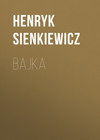Kitabı oku: «The Deluge. Vol. 2», sayfa 9
But the fire put down in blood, instead of dying, grew without ceasing, and a war began which was not on either side a question merely of victory, castles, towns, or provinces, but of life or death. Cruelty increased hatred, and they began not to struggle, but to exterminate each the other without mercy.
CHAPTER VII
This war of extermination was just beginning when Kmita, with the three Kyemliches, reached Glogov, after a journey which was difficult in view of Pan Andrei's shaken health. They arrived in the night. The town was crowded with troops, lords, nobles, servants of the king and of magnates. The inns were so occupied that old Kyemlich with the greatest trouble found lodgings for his colonel outside the town at the house of a rope-maker.
Pan Andrei spent the whole first day in bed in pain and fever from the burn. At times he thought that he should be seriously and grievously ill; but his iron constitution gained the victory. The following night brought him ease, and at daybreak he dressed and went to the parish church to thank God for his miraculous escape.
The gray and snowy winter morning had barely dissipated the darkness. The town was still sleeping, but through the church door lights could be seen on the altar, and the sounds of the organ came forth.
Kmita went to the centre of the church. The priest was celebrating Mass before the altar; there were few worshippers so far. At benches some persons were kneeling with their faces hidden in their hands; but besides those Pan Andrei saw, when his eyes had grown used to the darkness, a certain figure lying in the form of a cross in front of the pews on a carpet. Behind him were kneeling two youths with ruddy and almost angelic childish faces.
This man was motionless, and only from his breast moving continually with deep sighs could it be known that he was not sleeping, but praying earnestly and with his whole soul. Kmita himself became absorbed in a thanksgiving prayer; but when he had finished his eyes turned involuntarily to the man lying as a cross, and could not leave him; something fastened them to him. Sighs deep as groans, audible in the silence of the church, shook that figure continually. The yellow rays of the candles burning before the altar, together with the light of day, whitening in the windows, brought it out of the gloom, and made it more and more visible.
Pan Andrei conjectured at once from the dress that he must be some noted person, besides all present, not excepting the priest celebrating Mass, looked on him with honor and respect. The unknown was dressed entirely in black velvet bound with sable, but on his shoulders he had, turned down, a white lace collar, from under which peeped the golden links of a chain; a black hat with feathers of like color lay at his side; one of the pages kneeling beyond the carpet held gloves and a sword enamelled in blue. Kmita could not see the face of the unknown, for it was hidden by the folds of the carpet, and besides, the locks of an unusually thick wig scattered around his head concealed it completely.
Pan Andrei pressed up to the front pew to see the face of the unknown when he rose. Mass was then drawing to an end. The priest was singing Pater noster. The people who wished to be at the following Mass were coming in through the main entrance. The church was filled gradually with figures with heads shaven at the sides, dressed in cloaks with long sleeves, in military burkas, in fur cloaks, and in brocade coats. It became somewhat crowded. Kmita then pushed with his elbow a noble standing at his side, and whispered, —
"Pardon, your grace, that I trouble you during service, but my curiosity is most powerful. Who is that?" He indicated with his eyes the man lying in the form of a cross.
"Have you come from a distance, that you know not?" asked the noble.
"Certainly I come from a distance, and therefore I ask in hope that if I find some polite man he will not begrudge an answer."
"That is the king."
"As God lives!" cried Kmita.
But at that moment the king rose, for the priest had begun to read the Gospel.
Pan Andrei saw an emaciated face, yellow and transparent, like church wax. The eyes of the king were moist, and his lids red. You would have said that all the fate of the country was reflected in that noble face, so much was there in it of pain, suffering, care. Sleepless nights divided between prayer and grief, terrible deceptions, wandering, desertion, the humiliated majesty of that son, grandson, and great-grandson of powerful kings, the gall which his own subjects had given him to drink so bountifully, the ingratitude of that country for which he was ready to devote his blood and life, – all this could be read in that face as in a book, and still it expressed not only resignation, obtained through faith and prayer, not only the majesty of a king and an anointed of God, but such great, inexhaustible kindness that evidently it would be enough for the greatest renegade, the most guilty man, only to stretch out his hands to that father, and that father would receive him, forgive him, and forget his offences.
It seemed to Kmita at sight of him that some one had squeezed his heart with an iron hand. Compassion rose in the ardent soul of the young hero. Compunction, sorrow, and homage straitened the breath in his throat, a feeling of immeasurable guilt cut his knees under him so that he began to tremble through his whole body, and at once a new feeling rose in his breast. In one moment he had conceived such a love for that suffering king that to him there was nothing dearer on earth than that father and lord, for whom he was ready to sacrifice blood and life, bear torture and everything else in the world. He wished to throw himself at those feet, to embrace those knees, and implore forgiveness for his crimes. The noble, the insolent disturber, had died in him in one moment, and the royalist was born, devoted with his whole soul to his king.
"That is our lord, our unhappy king," repeated he to himself, as if he wished with his lips to give witness to what his eyes saw and what his heart felt.
After the Gospel, Yan Kazimir knelt again, stretched out his arms, raised his eyes to heaven, and was sunk in prayer. The priest went out at last, there was a movement in the church, the king remained kneeling.
Then that noble whom Kmita had addressed pushed Pan Andrei in the side.
"But who are you?" asked he.
Kmita did not understand the question at once, and did not answer it directly, so greatly were his heart and mind occupied by the person of the king.
"And who are you?" repeated that personage.
"A noble like yourself," answered Pan Andrei, waking as if from a dream.
"What is your name?"
"What is my name? Babinich; I am from Lithuania, from near Vityebsk."
"And I am Pan Lugovski, of the king's household. Have you just come from Lithuania, from Vityebsk?"
"No; I come from Chenstohova."
Pan Lugovski was dumb for a moment from wonder.
"But if that is true, then come and tell us the news. The king is almost dead from anxiety because he has had no certain tidings these three days. How is it? You are perhaps from the squadron of Zbrojek, Kalinski, or Kuklinovski, from near Chenstohova."
"Not from near Chenstohova, but directly from the cloister itself."
"Are you not jesting? What is going on there, what is to be heard? Does Yasna Gora defend itself yet?"
"It does, and will defend itself. The Swedes are about to retreat."
"For God's sake! The king will cover you with gold. From the very cloister do you say that you have come? How did the Swedes let you pass?"
"I did not ask their permission; but pardon me, I cannot give a more extended account in the church."
"Right, right!" said Pan Lugovski. "God is merciful! You have fallen from heaven to us! It is not proper in the church, – right! Wait a moment. The king will rise directly; he will go to breakfast before high Mass. To-day is Sunday. Come stand with me at the door, and when the king is going out I will present you. Come, come, there is no time to spare."
He pushed ahead, and Kmita followed. They had barely taken their places at the door when the two pages appeared, and after them came Yan Kazimir slowly.
"Gracious King!" cried Pan Lugovski, "there are tidings from Chenstohova."
The wax-like face of Yan Kazimir became animated in an instant.
"What tidings? Where is the man?" inquired he.
"This noble; he says that he has come from the very cloister."
"Is the cloister captured?" cried the king.
That moment Pan Andrei fell his whole length at the feet of the king. Yan Kazimir inclined and began to raise him by the arms.
"Oh, ceremony another time, another time!" cried he. "Rise, in God's name, rise! Speak quickly! Is the cloister taken?"
Kmita sprang up with tears in his eyes, and cried with animation, —
"It is not, and will not be taken, Gracious Lord. The Swedes are beaten. The great gun is blown up. There is fear among them, hunger, misery. They are thinking of retreat."
"Praise, praise to Thee, Queen of the Angels and of us!" said the king. Then he turned to the church door, removed his hat, and without entering knelt on the snow at the door. He supported his head on a stone pillar, and sank into silence. After a while sobbing began to shake him. Emotion seized all, and Pan Andrei wept loudly. The king, after he had prayed and shed tears, rose quieted, with a face much clearer. He inquired his name of Kmita, and when the latter had told his assumed one, said, —
"Let Pan Lugovski conduct you at once to our quarters. We shall not take our morning food without hearing of the defence."
A quarter of an hour later Kmita was standing in the king's chamber before a distinguished assembly. The king was only waiting for the queen, to sit down to breakfast. Marya Ludvika appeared soon. Yan Kazimir barely saw her when he exclaimed, —
"Chenstohova has held out! The Swedes will retreat! Here is Pan Babinich, who has just come, and he brings the news."
The black eyes of the queen rested inquiringly on the youthful face of the hero, and seeing its sincerity, they grew bright with joy; and he, when he had made a profound obeisance, looked also at her boldly, as truth and honesty know how to look.
"The power of God!" said the queen. "You have taken a terrible weight from our hearts, and God grant this is the beginning of a change of fortune. Do you come straight from near Chenstohova?"
"Not from near Chenstohova, he says, but from the cloister itself, – one of the defenders!" exclaimed the king. "A golden guest! God grant such to come daily; but let him begin. Tell, brother, tell how you defended yourselves, and how the hand of God guarded you."
"It is sure, Gracious King and Queen, that nothing saved us but the guardianship of God and the miracles of the Most Holy Lady, which I saw every day with my eyes."
Here Kmita was preparing for his narrative, when new dignitaries appeared. First came the nuncio of the Pope; then the primate, Leshchynski; after him Vydjga, a golden-mouthed preacher, who was the queen's chancellor, later bishop of Varmia, and finally primate. With him came the chancellor of the kingdom, Pan Korytsinski, and the Frenchman De Noyers, a relative of the queen, and other dignitaries who had not deserted the king in misfortune, but chose to share with him the bitter bread of exile rather than break plighted faith.
The king was eager to hear; therefore he ceased eating, every moment, and repeated, "Listen, gentlemen, listen; a guest from Chenstohova! Good news; hear it! From Yasna Gora itself!"
Then the dignitaries looked with curiosity on Kmita, who was standing as it were before a court; but he, bold by nature and accustomed to intercourse with great people, was not a whit alarmed at sight of so many celebrated persons; and when all had taken their places, he began to describe the whole siege.
Truth was evident in his words; for he spoke with clearness and strength, like a soldier who had seen everything, touched everything, passed through everything. He praised to the skies Pan Zamoyski and Pan Charnyetski; spoke of Kordetski, the prior, as of a holy prophet; exalted other fathers; missed no one save himself; but he ascribed the whole success of the defence, without deviation, to the Most Holy Lady, to Her favor and miracles.
The king and the dignitaries listened to him in amazement. The archbishop raised his tearful eyes to heaven. Father Vydjga interpreted everything hurriedly to the nuncio; other great personages caught their heads; some prayed, or beat their breasts.
At last, when Kmita came to the recent storms, – when he began to relate how Miller had brought heavy guns from Cracow, and among them one against which not only the walls of Chenstohova, but no walls in the world could stand, – such silence began as though some one were sowing poppy seeds, and all eyes rested on Pan Andrei's lips.
But he stopped suddenly, and began to breathe quickly; a clear flush came out on his face; he frowned, raised his head, and spoke boldly: "Now I must speak of myself, though I should prefer to be silent. And if I say aught which seems praise, God is my witness that I do so not for rewards, for I do not need them, since the greatest reward for me is to shed my blood for majesty."
"Speak boldly, I believe you," said the king. "But that great gun?"
"That great gun – I, stealing out in the night from the fortress, blew into fragments with powder."
"O loving God!" cried the king.
But after this cry was silence, such astonishment had seized each person. All looked as at a rainbow at the young hero, who stood with flashing eyes, with a flush on his face, and with head proudly erect. And so much was there in him at that moment of a certain terribleness and wild courage that the thought came to each one unwittingly, such a man might dare such a deed. After silence of a moment the primate said, —
"This man looks like that!"
"How did you do it?" asked the king.
Kmita explained how he did it.
"I cannot believe my ears," said Pan Korytsinski, the chancellor.
"Worthy gentlemen," answered the king, with dignity, "you do not know whom we have before us. There is yet hope that the Commonwealth has not perished while it gives such cavaliers and citizens."
"This man might say of himself, 'Si fractus illabatur orbis, impavidum ferient ruinæ (If the broken firmament should fall the ruins would strike him unterrified)!'" said Father Vydjga, who loved to quote authors at every opportunity.
"These are almost impossible things," said the chancellor again. "Tell, Cavalier, how you brought away your life, and how you passed through the Swedes."
"The explosion stunned me," said Kmita, "and next day the Swedes found me in the ditch lying as if lifeless. They judged me at once, and Miller condemned me to death."
"Then did you escape?"
"A certain Kuklinovski begged me of Miller, so that he might put me to death, for he had a fierce animosity against me."
"He is a well-known disturber and murderer; we have heard of him," said the castellan of Kjyvinsk. "His regiment is with Miller at Chenstohova. That is true!"
"Previously Kuklinovski was an envoy from Miller to the cloister, and once tried to persuade me in secret to treason when I was conducting him to the gate. I struck him in the face and kicked him. For that insult he was enraged against me."
"Ah, this I see is a noble of fire and sulphur!" cried the king, amused. "Do not go into such a man's road. Did Miller then give you to Kuklinovski?"
"He did, Gracious Gentlemen. Kuklinovski shut me with himself and some men in an empty little barn. There he had me tied to a beam with ropes, then he began to torture me and to burn my sides with fire."
"By the living God!"
"While doing this he was called away to Miller; when he was gone three nobles came, certain Kyemliches, his soldiers, who had served with me previously. They killed the guards, and unbound me from the beam – "
"And you fled! Now I understand," said the king.
"No, your Royal Grace. We waited for the return of Kuklinovski. Then I gave command to tie him to that same beam, and I burned him better with fire."
When he had said this, Kmita, roused by remembrance, became red again, and his eyes gleamed like those of a wolf. But the king, who passed easily from grief to joy, from seriousness to sport, began to strike the table with his hand, and exclaim with laughter, —
"That was good for him! that was good for him! Such a traitor deserved nothing better!"
"I left him alive," continued Kmita, "but he must have perished from cold before morning."
"That's a deed; he does not give away his own. We need more of such!" cried the king, now completely delighted. "Did you come hither with those soldiers? What are their names?"
"They are Kyemlich, a father and two sons."
"My mother is from the house of Kyemlich," said Father Vydjga.
"It is evident that there are great and small Kyemliches," answered Kmita, smiling; "these are not only small persons, but robbers; they are fierce soldiers, however, and faithful to me."
Meanwhile the chancellor, who had been whispering for a time in the ear of the Archbishop of Gnyezno, said at last, —
"Many come here who for their own praise or for an expected reward are glad to raise dust. They bring false and disturbing news, and are frequently sent by the enemy."
This remark chilled all present. Kmita's face became purple.
"I do not know the office of your grace," said he, "which, I think, must be considerable, therefore I do not wish to offend you; but there is no office, as I think, which would empower any one to give the lie to a noble, without reason."
"Man! you are speaking to the grand chancellor of the kingdom," said Lugovski.
"Whoso gives me the lie, even if he is chancellor, I answer him, it is easier to give the lie than to give your life, it is easier to seal with wax than with blood!"
Pan Korytsinski was not angry; he only said: "I do not give you the lie, Cavalier; but if what you say is true, you must have a burned side."
"Come to another place, your great mightiness, to another room, and I will show it to you!" roared Kmita.
"It is not needful," said the king; "I believe you without that."
"It cannot be, your Royal Grace," exclaimed Pan Andrei; "I wish it myself, I beg it as a favor, so that here no one, even though I know not how worthy, should make me an exaggerator. My torment would be an ill reward; I wish belief."
"I believe you," answered the king.
"Truth itself was in his words," added Marya Ludvika. "I am not deceived in men."
"Gracious King and Queen, permit. Let some man go aside with me, for it would be grievous for me to live here in suspicion."
"I will go," said Pan Tyzenhauz, a young attendant of the king. So saying, he conducted Kmita to another room, and on the way said to him, "I do not go because I do not believe you, for I believe; but to speak with you. Have we met somewhere in Lithuania? I cannot remember your name, for it may be that I saw you when a youth, and I myself was a youth then?"
Kmita turned away his face somewhat to hide his sudden confusion.
"Perhaps at some provincial diet. My late father took me with him frequently to see public business."
"Perhaps. Your face is surely not strange to me, though at that time it had not those scars. Still see how memoria fragilis est (weak memory is); also it seems to me you had a different name."
"Years dull the memory," answered Pan Andrei.
They went to another room. After a while Tyzenhauz returned to the royal pair.
"He is roasted, Gracious King, as on a spit," said he; "his whole side is burned."
When Kmita in his turn came back, the king rose, pressed his head, and said, —
"We have never doubted that you speak the truth, and neither your pain nor your services will pass unrewarded."
"We are your debtors," added the queen, extending her hand to him.
Pan Andrei dropped on one knee and kissed with reverence the hand of the queen, who stroked him on the head like a mother.
"Be not angry with the chancellor," said the king. "In this place there are really not a few traitors, or, if not traitors, men who are unwise, that wind three after three, and it belongs to the chancellor's office to discover truth touching public affairs."
"What does my poor anger mean for such a great man?" answered Pan Andrei. "And I should not dare to murmur against a worthy senator, who gives an example of loyalty and love of country to all."
The chancellor smiled kindly and extended his hand. "Well, let there be peace! You spoke ill to me of wax; but know this, that the Korytsinskis have sealed often with blood, not with wax only."
The king was rejoiced. "This Babinich has pleased us," said he to the senators, "has touched our heart as few have. We will not let you go from our side, and God grant that we shall return together soon to our beloved country."
"Oh, Most Serene King," cried Kmita, with ecstasy; "though confined in the fortress of Yasna Gora, I know from the nobles, from the army, and even from those who, serving under Zbrojek and Kalinski, besieged Chenstohova, that all are waiting for the day and the hour of your return. Only show yourself. Gracious Lord, and that day all Lithuania, Poland, and Russia will stand by you as one man! The nobles will join; even insignificant peasants will go with their lord to resist. The army under the hetmans is barely breathing from eagerness to move against the Swedes. I know this, too, that at Chenstohova deputies came from the hetmans' troops to arouse Zbrojek, Kalinski, and Kuklinovski, against the Swedes. Appear on the boundary to-day, and in a week there will not be a Swede; only appear, only show yourself, for we are there like sheep without a shepherd."
Sparks came from Kmita's eyes while he was speaking, and such great ardor seized him that he knelt in the middle of the hall. His enthusiasm was communicated even to the queen herself, who, being of fearless courage, had long been persuading the king to return.
Therefore, turning to Yan Kazimir, she said with energy and determination: "I hear the voice of the whole people through the mouth of this noble."
"That is true, that is true, Gracious Lady, our Mother!" exclaimed Kmita.
But certain words in what Kmita had said struck the chancellor and the king.
"We have always been ready," said the king, "to sacrifice our health and life, and hitherto we have been waiting for nothing else but a change in our subjects."
"That change has taken place already," said Marya Ludvika.
"Majestas infracta malis (Majesty unbroken by misfortune)!" said Father Vydjga, looking at her with homage.
"It is important," said the archbishop, "if, really, deputations from the hetmans went to Chenstohova."
"I know this from my men, those Kyemliches," answered Pan Andrei. "In the squadrons of Zbrojek and Kalinski all spoke openly of this, paying no attention to Miller and the Swedes. These Kyemliches were not enclosed in the fortress; they had relations with the world, with soldiers and nobles, – I can bring them before your Royal Grace and your worthinesses; let them tell how it is seething in the whole country as in a pot. The hetmans joined the Swedes from constraint only; the troops wish to return to duty. The Swedes beat nobles and priests, plunder, violate ancient liberties; it is no wonder then that each man balls his fist and looks anxiously at his sabre."
"We, too, have had news from the troops," said the king; "there were here, also, secret envoys who told us of the general wish to return to former loyalty and honor."
"And that agrees with what this cavalier tells," said the chancellor. "But if deputations are passing among the regiments it is important, for it means that the fruit is already ripe, that our efforts were not vain, that our work is accomplished, that the time is at hand."
"But Konyetspolski," said the king, "and so many others who are still at the side of the invader, who look into his eyes and give assurances of their devotion?"
Then all grew silent, the king became gloomy on a sudden, and as when the sun goes behind a cloud a shadow covers at once the whole world, so did his face grow dark. After a time he said, —
"God sees in our heart that even to-day we are ready to move, and that not the power of Sweden detains us, but the unhappy fickleness of our people, who, like Proteus, take on a new form every moment. Can we believe that this change is sincere, this desire not imagined, this readiness not deceitful? Can we believe that people who so recently deserted us, and with such light hearts joined the invader against their own king, against their own country, against their own liberties? Pain straitens our heart, and we are ashamed of our own subjects! Where does history show such examples? What king has met so many treasons, so much ill-will? Who has been so deserted? Call to mind, your kindnesses, that we in the midst of our army, in the midst of those who were bound to shed their blood for us, – it is a danger and a terror to tell it, – we were not sure of our life. And if we left the country and had to seek an asylum, it is not from fear of the Swedish enemy, but of our own subjects, to save our own children from the terrible crime of king murder and parricide."
"Gracious Lord!" exclaimed Kmita; "our people have sinned grievously; they are guilty, and the hand of God is punishing them justly; but still, by the wounds of Christ, there has not been found among that people, and God grant that there will never be found, a man who would raise his hand on the sacred person of the anointed of God."
"You do not believe, because you are honest," said the king, "but we have letters and proofs. The Radzivills have paid us badly for the kindness with which we have covered them; but still Boguslav, though a traitor, was moved by conscience, and not only did he not wish to lend a hand to such a deed, but he was the first to warn us of it."
"What deed?" asked the astonished Kmita.
"He informed us," said the king, "that there was a man who offered for one hundred gold ducats to seize us and deliver us, living or dead, to the Swedes."
A shiver passed through the whole assembly at these words of the king, and Kmita was barely able to groan out the question, "Who was that man? – who was he?"
"A certain Kmita," answered the king.
A wave of blood suddenly struck Pan Andrei in the head, it grew dark in his eyes, he seized his forelock, and with a terribly wandering voice said: "That is a lie! Prince Boguslav lies like a dog! Gracious King, believe not that traitor; he did that of purpose to bring infamy on an enemy, and to frighten you, my king. He is a traitor! Kmita would not have done such a deed."
Here Pan Andrei turned suddenly where he was standing. His strength, exhausted by the siege, undermined by the explosion of powder in the great gun, and through the torture given by Kuklinovski, left him altogether, and he fell without consciousness at the feet of the king.
They bore him into the adjoining room, where the king's physician examined him. But in the assembly of dignitaries they knew not how to explain why the words of the king had produced such a terrible impression on the young man.
"Either he is so honest that horror alone has thrown him off his feet, or he is some relative of that Kmita," said the castellan of Cracow.
"We must ask him," replied the chancellor. "In Lithuania nobles are all related one to another, as in fact they are with us."
"Gracious Lord," said Tyzenhauz, "God preserve me from wishing to speak evil of this young man; but we should not trust him at present too much. That he served in Chenstohova is certain, – his side is burned; this the monks would not have done in any event, for they as servants of God must have every clemency, even for prisoners and traitors; but one thing is coming continually to my head and destroying trust in him, that is, I met him somewhere in Lithuania, – still a youth, at a diet or a carnival, – I don't remember – "
"And what of that?" asked the king.
"And it seems to me always that his name was not Babinich."
"Do not tell every little thing," said the king; "you are young and inattentive, and a thing might easily enter your head. Whether he is Babinich or not, why should I not trust him? Sincerity and truth are written on his lips, and evidently he has a golden heart. I should not trust myself, if I could not trust a soldier who has shed his blood for us and the country."
"He deserves more confidence than the letter of Prince Boguslav," said the queen, suddenly, "and I recommend this to the consideration of your worthinesses, there may not be a word of truth in that letter. It might have been very important for the Radzivills of Birji that we should lose courage completely, and it is easy to admit that Prince Boguslav wished also to ruin some enemy of his, and leave a door open to himself in case of changed fortune."
"If I were not accustomed," said the primate, "to hear wisdom itself coming from the mouth of the gracious queen, I should be astonished at the quickness of these words, worthy of the ablest statesman – "
"Comasque gerens, animosque viriles (Though wearing tresses, she has the courage of a man)," interrupted Father Vydjga, in a low voice.
Encouraged by these words, the queen rose from her chair and began to speak: "I care not for the Radzivills of Birji, for they, as heretics, listen easily to the whispers of the enemy of the human race; nor of the letter of Prince Boguslav, which may touch private affairs. But I am most pained by the despairing words of my lord and husband, the king, spoken against this people. For who will spare them if their own king condemns them? And still, when I look through the world, I ask in vain, where is there another such people in which the praise of God endures with the manner of ancient sincerity and increases continually? In vain do I look for another people in which such open candor exists. Where is there another State in which no one has heard of those hellish blasphemies, subtle crimes, and never ending feuds with which foreign chronicles are filled. Let people skilled in the history of the world show me another kingdom where all the kings died their own quiet deaths. You have no knives or poisons here; you have no protectors, as among the English. It is true that this nation has grown grievously guilty, has sinned through frivolity and license. But where is the nation that never errs, and where is the one which, as soon as it has recognized its offence, begins penance and reformation? Behold they have already taken thought, they are now coming, beating their breasts to your majesty, ready to spill their blood, to yield their lives, to sacrifice their fortune for you. And will you reject them; will you not forgive the penitent; will you not trust those who have reformed, those who are doing penance; will you not return the affection of a father to children who have erred? Trust them, since they are yearning for their Yagyellon blood, and for your government, which is of their fathers. Go among them; I, a woman, fear no treason, for I see love, I see sorrow for sins and restoration of this kingdom to which they called you after your father and your brother. It does not seem to me likely that God will destroy such a great commonwealth, in which the light of the true faith is burning. For a short period God's justice has stretched forth the rod to chastise, not to ruin its children, and soon will the fatherly love of that heavenly Lord receive them and cherish them. But do not contemn them, O king, and fear not to confide in their sonly discretion, for in this way alone can you turn evil into good, suffering into comfort, defeat into triumph."










